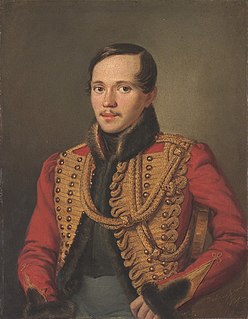A Quote by Mikhail Lermontov
The history of a man's soul, even the pettiest soul, is hardly less interesting and useful than the history of a whole people; especially when the former is the result of the observations of a mature mind upon itself, and has been written without any egotistical desire of arousing sympathy or astonishment. Rousseau's Confessions has precisely this defect – he read it to his friends.
Related Quotes
The unique impression of Jesus upon mankind - whose name is not so much written as ploughed into the history of the world - is proof of the subtle virtue of this infusion. Jesus belonged to the race of prophets. He saw with open eyes the mystery of the soul. One man was true to what is in you and me. He, as I think, is the only soul in history who has appreciated the worth of man.
Great artistic talent in any direction... is hardly inherent to the man. It comes and goes; it is often possessed only for a short phase in his life; it hardly ever colors his character as a whole and has nothing to do with the moral and intellectual stuff of the mind and soul. Many great artists, perhaps most great artists, have been poor fellows indeed, whom to know was to despise.
It is in Rousseau's writing above all that history begins to turn from upper-class honour to middle-class humanitarianism. Pity, sympathy and compassion lie at the centre of his moral vision. Values associated with the feminine begin to infiltrate social existence as a whole, rather than being confined to the domestic sphere.
To trace the history of a river or a raindrop is also to trace the history of the soul, the history of the mind descending and arising in the body. In both, we constantly seek and stumble upon divinity, which like feeding the lake, and the spring becoming a waterfall, feeds, spills, falls, and feeds itself all over again.
Perhaps the history of the errors of mankind, all things considered, is more valuable and interesting than that of their discoveries. Truth is uniform and narrow; it constantly exists, and does not seem to require so much an active energy, as a passive aptitude of the soul in order to encounter it. But error is endlessly diversified; it has no reality, but is the pure and simple creation of the mind that invents it. In this field the soul has room enough to expand herself, to display all her boundless faculties, and all her beautiful and interesting extravagancies and absurdities.
By and large it is uniformly true in mathematics that there is a time lapse between a mathematical discovery and the moment when it is useful; and that this lapse of time can be anything from 30 to 100 years, in some cases even more; and that the whole system seems to function without any direction, without any reference to usefulness, and without any desire to do things which are useful.
While the body is young and fine, the soul blunders, but as the body grows old it attains its highest power. Again, every good soul uses mind; but no body can produce mind: for how should that which is without mind produce mind? Again, while the soul uses the body as an instrument, it is not in it; just as the engineer is not in his engines (although many engines move without being touched by any one).
History, when rightly written, is but a record of providence; and he who would read history rightly, must read it with his eyes constantly fixed on the hand of God. This statement of a nineteenth-century historian sums up the responsibility of the Christian teacher of history, for he who would teach history or any subject matter rightly, must teach it with his eyes constantly fixed on the hand of God.





































